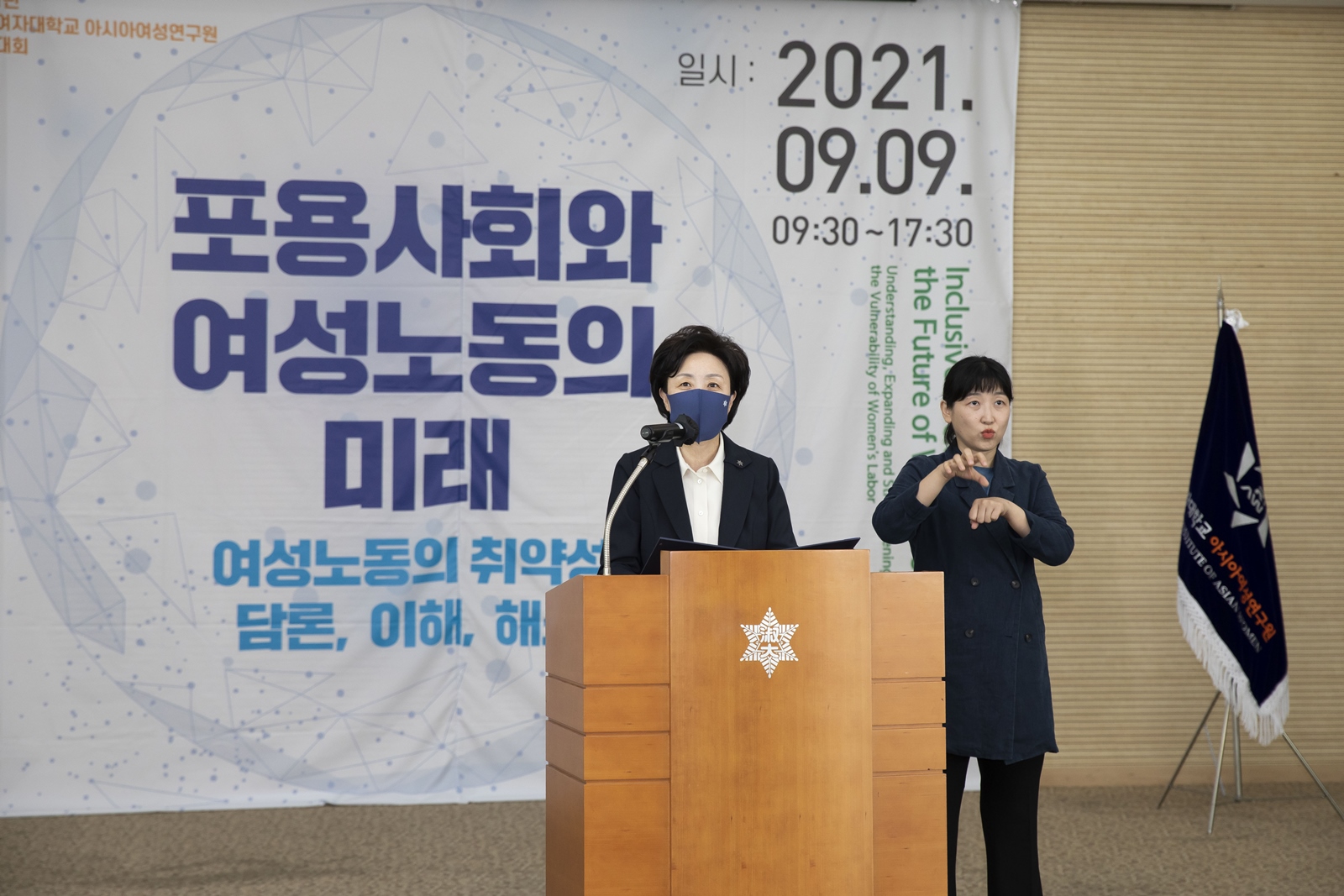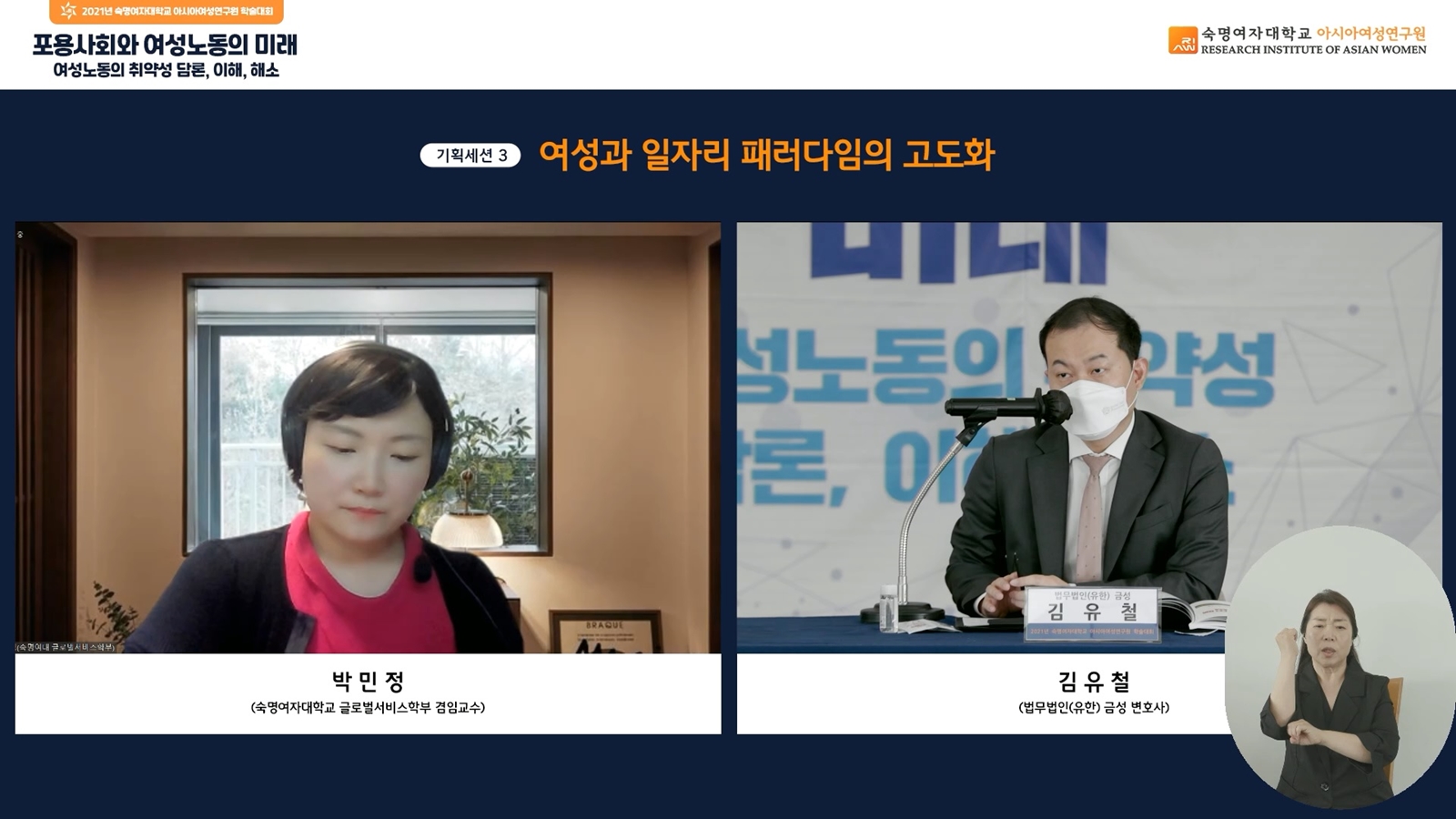Successfully completed the academic conference “Inclusive Society and the Future of Women's Labor”
- Views 6328
- Writer 커뮤니케이션팀
- 보도일자 2021-11-15
The Research Institute of Asian Women at Sookmyung Women’s University successfully held the academic conference “Inclusive Society and the Future of Women's Labor: Discourse, Understanding, Expanding and Strengthening the Vulnerability of Women's Labor” through online videoconference on September 9th (Thu).

The conference is an annual event held by The Research Institute of Asian Women, and this year, the same as last year, on-site participants were limited to panelists and presenters to prevent the spread of COVID-19. The audience watched the on-site video transmitted in real time through the video conferencing platform “Zoom.” Sign language interpreters were also supported at the event to increase accessibility for the disabled and to improve the environment that marginalizes the disabled.
The conference, which began with the opening remarks by Director Minsun CHANG of The Research Institute of Asian Women, welcome remarks by President Yunkeum Chang, and congratulatory remarks by President Yukyung Mun of the Korean Women's Development Institute, consisted of three special sessions and one special session for students.
Session 1 was held under the theme of “Discourse on an inclusive society and women's labor.” The participants discussed the discrimination experienced by women workers such as ▲ “Philosophytic exploration on humanity, disability, and discrimination” by Gwiyeon Shim, Academic Research Professor at Gyeongsang National University's Humanities Research Institute, ▲ “Early work experience and career challenges of young women” by Hayoung Shin by Professor of College of General Education at Semyung University ▲ “Characteristics of the Korean women's labor market and measures to manage women's human resources at the national level in the era of COVID-19” by Professor Jihyeon Shim of the Department of Human Resource Development at Sookmyung Women’s University were discussed.
In the 2nd session, studies for “understanding and expanding the women's labor market” were presented. The presenters identified the current situation by citing specific statistical data, and suggested impeding factors and improvement factors. The session was composed of ▲ “Restrictions on change of workplace and relocation of foreign workers” by Gyuyong Lee, director of the Korea Labor Institute, and Wooncheol Shin, director of Research Center of the Korea Institute of Technology and Education, ▲ “COVID-19 and gender inequality” by Yunjeong Jeon, an investigator at the National Assembly Research Service, and ▲ “The characteristics and prospects of the Korean welfare state through the structure of inequality by life cycle” Yoojin Yeo, a senior researcher at the Korea Institute for Health and Social Affairs.

The 3rd session discussing the changes in the women's labor market after COVID-19 consisted of presentations such as ▲ “Impact of COVID-19 on women in informal sector: Case studies from Asia & Ghana” by Agnes Khoo, an adjunct professor at Sungkonghoe University, and ▲ “COVID-19 crisis and women's jobs” by Minjung Park, an adjunct professor at the School of Global Services at Sookmyung Women’s University. They pointed out what kind of crisis various countries are facing in terms of the women's labor market due to COVID-19.
The last session was a special session for students. Undergraduate students (Seongyeon Won, Sohyeong Jang, and Jiwon Nam) from the “이루다안(安),” a student club for students with disabilities at Sookmyung Women’s University, concluded the academic conference by presenting the actual conditions of the labor market and improvement plans from the perspective of women with disabilities who are facing the intersecting difficulties of women and people with disabilities.
An official from the Research Institute of Asian Women said, "Through the academic conference, the essence of the problem and reasonable alternatives was presented by in-depth quantitative and qualitative analysis of the discrimination in the labor market experienced by socially vulnerable groups including women," and “through this, we wanted to ultimately contribute to social cohesion and suggest an alternative for the future society to protect the socially disadvantaged.”



